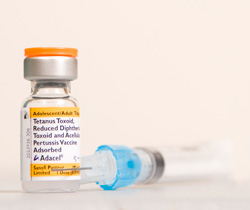Story by Mikayla Marshall, Staff writer

The TDaP vaccine shot helps prevent the whooping cough.
Public Health will administer the tetanus diphtheria and pertussis vaccine in the spring if enough students show interest in receiving the vaccine.
The TDaP vaccine is known for preventing the whooping cough (Pertussis). Last year, there was an increase in cases of whooping cough across the state of Kentucky. There were an estimated 87 cases in August through December alone, said Kim Paschall, Director of Health Services. One case was confirmed on Murray State’s campus in Fall 2015. Health Services worked with Public Health to ensure the disease did not spread further by isolating the individual and taking sanitary precautions.
Symptoms of whooping cough are similar to those of a cold, with constant coughing, running nose and fever. If it progresses, coughing fits that lead to vomiting are expected, according to the Center for Disease Control and Prevention. If a person gets the disease after receiving the vaccine, the cough will not last as long and recovery will be faster.
Health Services highly recommends students get the vaccine if they did not receive it before coming to the university.
“They should definitely consider getting it,” Paschall said. “We plan to market the vaccine better throughout campus, so more people are aware it is available.”
TDaP prevents tetanus, diphtheria and pertussis. All can lead to death if not properly treated. Pertussis is the biggest concern on college campuses because the close classrooms and living quarters make it easier for the disease to spread.
“If it was an issue on campus I would for sure get the vaccine, especially if it is convenient,” said Callie Adams, freshman from Murray.
She first heard of the outbreak when there was talk of the disease going around in the residential colleges. She said other people should definitely consider getting it.
The vaccine will be here soon but will only be ordered if more students show interest. It will be $10 per vaccine.
“I would have to look into it more, but if I felt like I needed it, I would get it,” said Clay Abell, freshman from Taylorsville, Kentucky.
Most people get the vaccine as newborns or at the ages of 11 or 12. Even if a person has received the vaccine at these ages, it is still recommended to get it as an adult. Since vaccination began, reports of cases for pertussis have dropped by 80 percent, according to the Center for Disease Control.
Most adults do not know if they have received the vaccine at an earlier age.
“If I have received it, then I do not remember,” Adams said.
Some parents do not let their children receive the vaccines because of the stigma that vaccines cause mental disorders, like autism.
“I would receive it, I am definitely for vaccines,” said Katy Bretschneider, senior from Owensboro, Kentucky.